Book contents
- Frontmatter
- Contents
- List of maps
- Preface to the Second Edition
- A note on geography
- CAMBRIDGE LATIN AMERICAN STUDIES
- PART I Birth of a nation-state, 1800s–1830s
- PART II The rise of a republic, 1830s–1880s
- PART III The nitrate era, 1880s–1930s
- PART IV Industrial advance and the dawn of mass politics, 1930s–1960s
- PART V Democracy and dictatorship, 1960s–2000s
- 11 Revolution in liberty, 1964–70
- 12 The Chilean road to socialism, 1970–73
- 13 The Pinochet years
- 14 Re-encounter with history, 1990–2002
- Glossary of Spanish terms
- Initials and acronyms
- Further reading
- Index
12 - The Chilean road to socialism, 1970–73
Published online by Cambridge University Press: 05 June 2012
- Frontmatter
- Contents
- List of maps
- Preface to the Second Edition
- A note on geography
- CAMBRIDGE LATIN AMERICAN STUDIES
- PART I Birth of a nation-state, 1800s–1830s
- PART II The rise of a republic, 1830s–1880s
- PART III The nitrate era, 1880s–1930s
- PART IV Industrial advance and the dawn of mass politics, 1930s–1960s
- PART V Democracy and dictatorship, 1960s–2000s
- 11 Revolution in liberty, 1964–70
- 12 The Chilean road to socialism, 1970–73
- 13 The Pinochet years
- 14 Re-encounter with history, 1990–2002
- Glossary of Spanish terms
- Initials and acronyms
- Further reading
- Index
Summary
As in the classic Greek tragedies, everybody knows what will happen, everybody says they do not wish it to happen, and everybody does exactly what is necessary to bring about the disaster….
– Radomiro Tomic to General Carlos Prats (August 1973)Born into a comfortable, if not affluent, Valparaiso family, Salvador Allende (he was 62 in 1970) had originally wanted to become a physician, like his respected paternal grandfather, Ramón Allende Padín, the Radical politician and Serene Grand Master of Chilean freemasonry. (Allende himself was a loyal and lifelong freemason.) While studying medicine, he discovered firsthand the appalling conditions of the poor, and in particular their medical situation – malnutrition, infant mortality, congenital disease. Though he qualified as a doctor, politics gradually superseded medicine as his real vocation. He was active in the FECH, and was briefly jailed during the Ibáñez dictatorship. He quickly rose to prominence in the fledgling Socialist party of the 1930s, was elected a deputy for Valparaiso in 1937, and served as minister of Health between 1939 and 1942. In 1945 he became a senator, and remained in the upper house (rising to be its president in 1966) until he moved to the Moneda. He was a politician to the marrow of his bones.
There can be no denying the enthusiasm with which allendistas greeted the new government and which remained alive for many (if not most) of them while it ran its course. The Left had come into its own at long last.
- Type
- Chapter
- Information
- A History of Chile, 1808–2002 , pp. 330 - 358Publisher: Cambridge University PressPrint publication year: 2004

